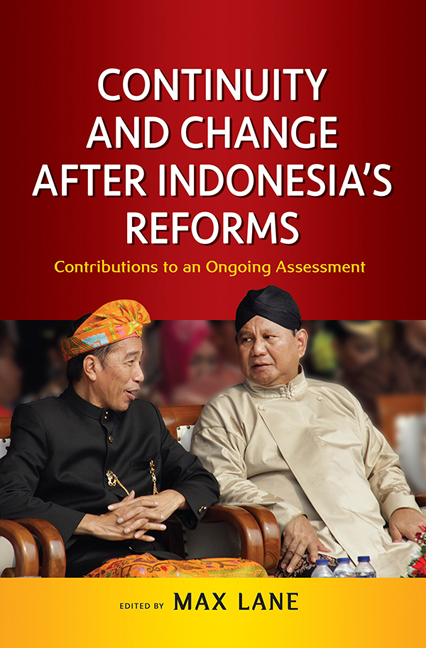Book contents
- Frontmatter
- Contents
- Preface
- About the Contributors
- 1 Indonesia's New Politics: Transaction Without Contestation
- 2 Indonesian Parties Twenty Years On: Personalism and Professionalization amidst Dealignment
- 3 Ideologies of Joko Widodo and Indonesian Political Parties
- 4 Political Islam Movements and Democracy in Indonesia: A Changing Landscape?
- 5 Creating Leadership Legitimacy in Post-Reform Indonesia
- 6 The Political Middle Class in Post-Soeharto Era Indonesia
- 7 The Politics of Centre–Local Relations in Contemporary Indonesia
- 8 The Roots and Actors of Corruption in the Political Realm
- 9 Why Is It Really Hard to Move On? Explaining Indonesia's Limited Foreign Policy Reform After Soeharto
- 10 Papua under the Joko Widodo Presidency
- 11 Youth “Alienation” and New Radical Politics: Shifting Trajectories in Youth Activism
- Index
10 - Papua under the Joko Widodo Presidency
Published online by Cambridge University Press: 06 September 2019
- Frontmatter
- Contents
- Preface
- About the Contributors
- 1 Indonesia's New Politics: Transaction Without Contestation
- 2 Indonesian Parties Twenty Years On: Personalism and Professionalization amidst Dealignment
- 3 Ideologies of Joko Widodo and Indonesian Political Parties
- 4 Political Islam Movements and Democracy in Indonesia: A Changing Landscape?
- 5 Creating Leadership Legitimacy in Post-Reform Indonesia
- 6 The Political Middle Class in Post-Soeharto Era Indonesia
- 7 The Politics of Centre–Local Relations in Contemporary Indonesia
- 8 The Roots and Actors of Corruption in the Political Realm
- 9 Why Is It Really Hard to Move On? Explaining Indonesia's Limited Foreign Policy Reform After Soeharto
- 10 Papua under the Joko Widodo Presidency
- 11 Youth “Alienation” and New Radical Politics: Shifting Trajectories in Youth Activism
- Index
Summary
President Joko Widodo (Jokowi) has shown more interest in Papua than any of his predecessors. He campaigned in Papua as a candidate in 2014. He won a strong majority of the vote in both Papuan provinces, with levels of support among the highest in the country. As president, Jokowi has visited Papua more often than earlier presidents and he has visited Papua more frequently than any other province outside Java.
Jokowi's appeal to voters in Papua was easier to explain than his interest in Papua. During the campaign he had discussed the possibility of a political dialogue, raised the prospect of addressing human rights issues and his informal political style was thought to appeal to the voters. Jokowi also had the great advantage of not being Prabowo Subianto, his opponent in the 2014 Presidential campaign, who is remembered in Papua for his record of human rights abuses in 1996 (IPAC 2014). There was little in his background in business or as mayor of Solo and governor of Jakarta to suggest why Jokowi should show an interest in one of Indonesia's most intractable issues.
During a visit to New Zealand in March 2018, Fransiscus Orlando, a Papuan student, asked the president what motivated him to make so many visits to Papua. Jokowi related how Papua had been neglected for far too long, but it was part of the Unitary State of Indonesia (NKRI) and had to be paid attention. He recalled his visit to the highland district of Nduga in December 2015.
At the time the head of the military had advised against the visit because Nduga was the most dangerous region. I flew there by helicopter because from Wamena to Nduga required four days and nights of travel through the jungle. In the Nduga district there was not one meter of sealed road. This made me very sad. It is my motivation to develop the infrastructure and human resources to the same level as other provinces (Sekretariat Kabinet Republik Indonesia 2018).
Nduga district strongly supported Jokowi in the 2014 election, but it has come to represent many of the problems the Jokowi's government confronts in Papua, beyond the poor infrastructure noted by the president.
- Type
- Chapter
- Information
- Continuity and Change after Indonesia's ReformsContributions to an Ongoing Assessment, pp. 213 - 237Publisher: ISEAS–Yusof Ishak InstitutePrint publication year: 2019



